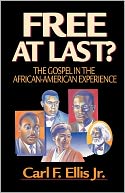 Carl Ellis in his book, Free At Last? The Gospel in the African-American Experience, makes this profound statement:
Carl Ellis in his book, Free At Last? The Gospel in the African-American Experience, makes this profound statement:
It is a disgrace that we have not learned to preache ‘the full counsel of God’ through our history, the way Stephen and later Paul were able to preach through Jewish history (Acts 7.2-53; 13.16-41).”
When we read our Bibles through classical lenses we ask the question, “What is the author saying?” But when we compose a jazz-shaped faith we realize there is another important question: “What is the author doing?” (for a complete discussion on this see chapter six of my book, Finding the Groove: Composing a Jazz-Shaped Faith)
Carl Ellis is reading the scriptures with jazz eyes. His argument is intricate but worth slowing down to understand. For example, if we read the books of I & II Kings with jazz lenses we don’t just want to know what we can learn from the lives of David, Solomon, Elisha & Elijah, but we push further and ask “what is the author doing?” Ellis writes points out that the people of God were in Babylon and “they were confused, to say the least. They had in their possession the Scriptures stating God’s promise that the land of Canaan would be theres forever. Yet here they were…captive minorities in the land of a foreign superpower.” Therefore,
“Someone was inspired by God to deal with these questions. He plunged into this awesome task by getting hold of three books: The Annals of solomon, The Annals of the Kings of Israel and The Annals of the Kings of Judah. He proceeded to select material out of these scrolls, analyze it and arrange it into a theological framework”
(You may want to check out these verses for reference I Kings 11.41, 15.7 & 23)
This process allowed the author of I & II Kings to answer for his people the fundamental question: Why are we here? The point is this. We can look at our history as African-Americans (or whatever people group you are a part) and seek to arrange it from a theological perspective and discover the gospel in the history of your people.
This is exactly what we see Stephen and Paul did. In the book of Acts we see them sharing the good news (gospel) by telling the history of their people. It is one thing to know our history and it’s quite another to know from God’s perspective. This is the task of a jazz theologian.
(Ellis quotes can be found on pp37-38 of Free at Last?)
